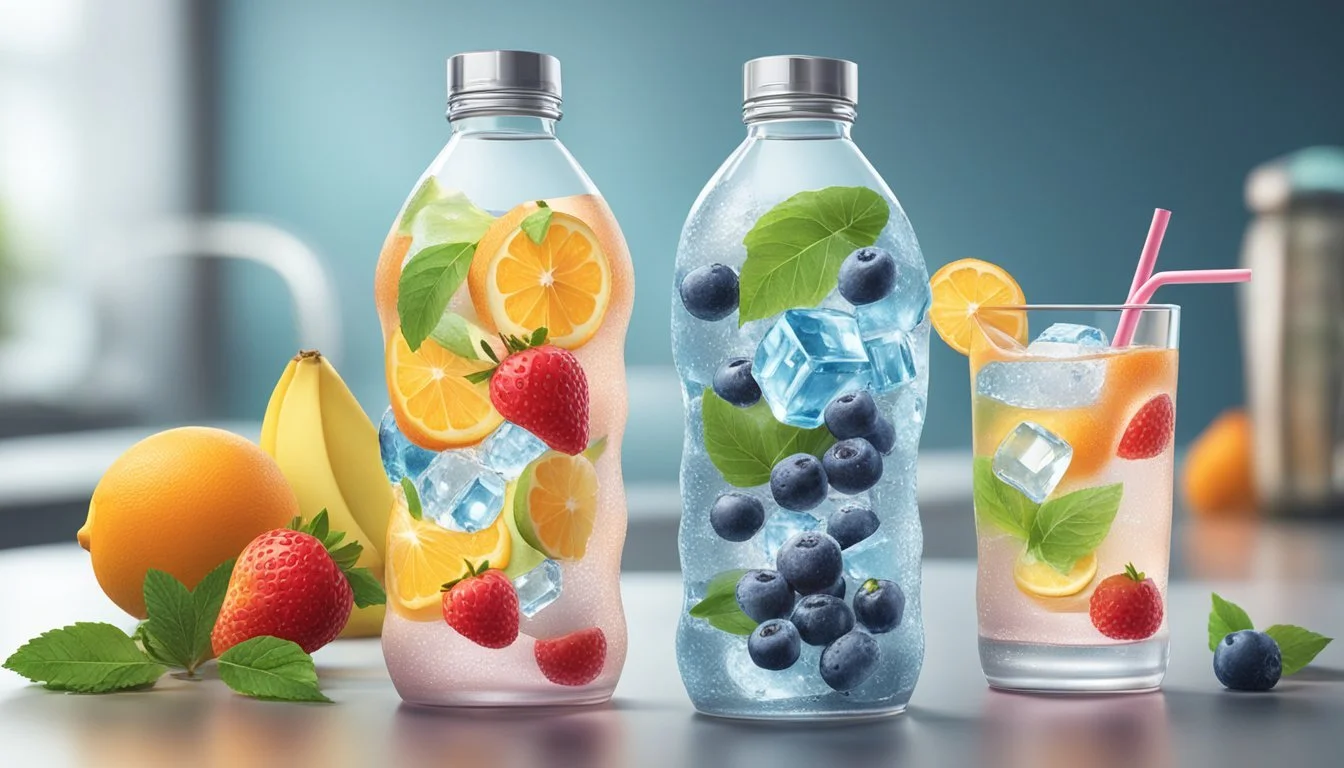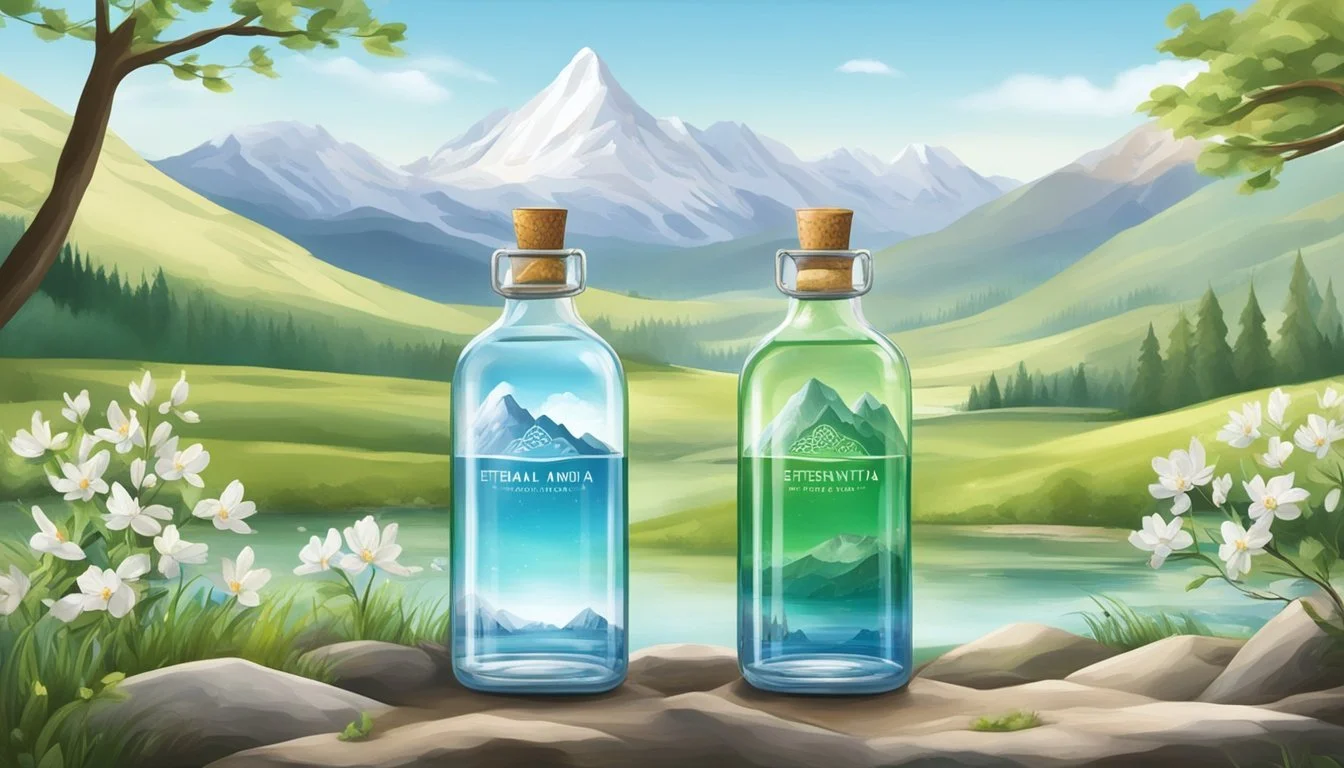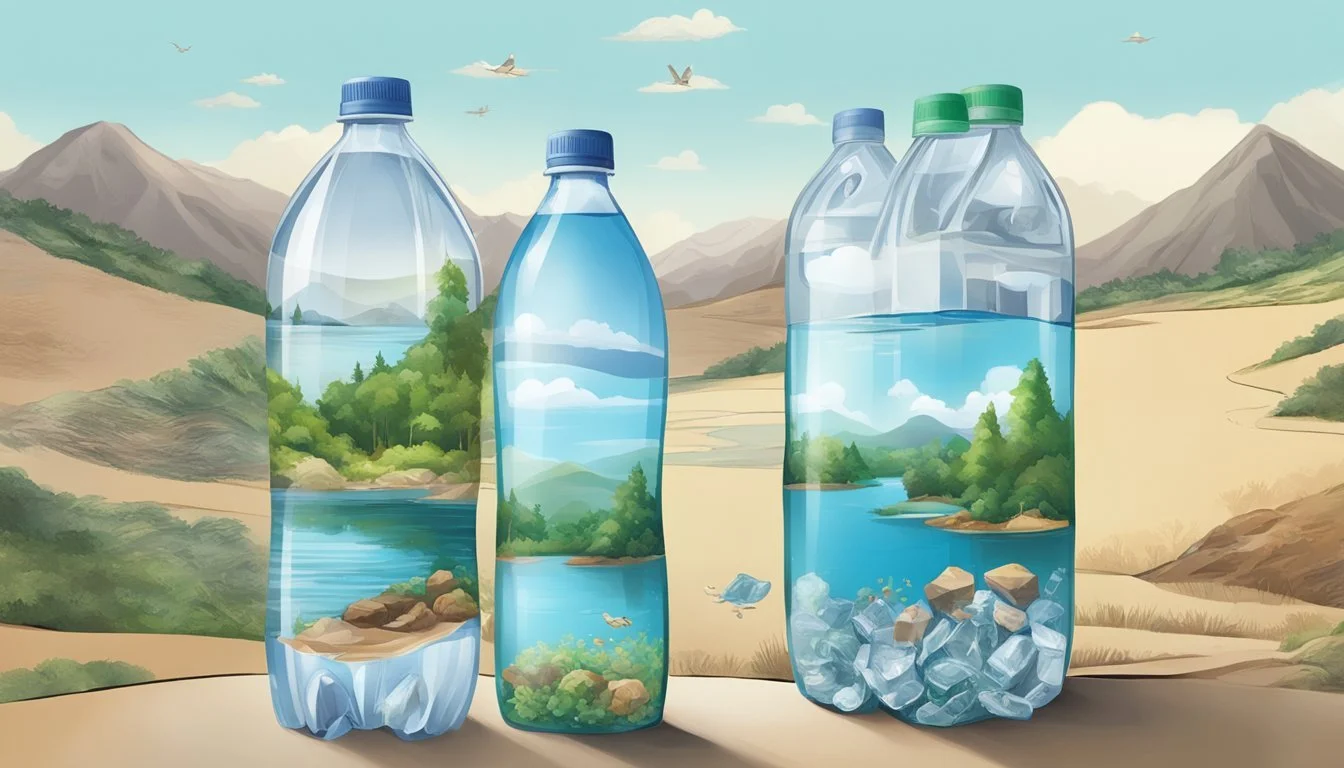Essentia vs. Eternal
Comparative Review of Bottled Water Brands
When it comes to staying hydrated, the quality of the water one drinks is often a priority for health-conscious consumers. Essentia and Eternal are two bottled water brands that have gained popularity in the market, each promising superior hydration through their unique processes and sources. Essentia is known for its ionization process, creating an alkaline water with a pH of 9.5 or higher and infusing it with electrolytes, while Eternal naturally sources its water and boasts a naturally alkaline pH from minerals.
Consumers frequently face the challenge of deciphering marketing claims and understanding the actual benefits of the bottled water they choose to drink. In the case of Essentia, the brand utilizes micro-filtration, reverse osmosis, and ultraviolet exposure to achieve 99.9% purity before the water is ionized. Eternal, on the other hand, relies on its natural spring sources to provide water that is already high in pH without the need for artificial processing.
The comparison between Essentia and Eternal water is not merely about pH levels or the presence of electrolytes. Factors such as taste, source sustainability, and the presence of contaminants or additives also play critical roles in determining which water might be better suited for individual preferences. It is the nuanced details and factual composition of these bottled waters that will guide informed decisions among discerning buyers.
Comparing Essentia and Eternal Water
In the domain of premium bottled water, Essentia and Eternal present distinct profiles, each championing their purification processes, sources, and eco-conscious packaging. Here's how they measure up in their respective categories.
Brand Overview: Essentia and Eternal
Essentia is known for its ionized alkaline water with a pH of 9.5 or higher, specifically designed to enhance hydration. The brand stresses its thorough filtration and ionization process, aiming to deliver a clean and smooth-tasting water. Eternal takes a different approach, marketing its naturally alkaline water bottled at the source, from protected springs. Their focus is on providing a natural mineral composition without additional processes.
Water Sources: Natural Springs and Purification
Essentia sources its water to undergo micro-filtration, reverse osmosis, and ultraviolet exposure reaching 99.9% purity before being infused with electrolytes.
Eternal opts for a more natural route, sourcing water from remote springs; the water's mineral profile and alkalinity result from its journey through underground rock formations.
Bottling Process: Sustainability and Materials
Both brands assert a commitment to sustainability, with Essentia utilizing BPA-free plastic bottles that are recyclable. Eternal has been innovative in this area as well, tending to favor BPA-free materials and exploring options beyond traditional plastic bottles, including recyclable cartons. In grocery stores, these choices resonate with environmentally-conscious consumers who prefer sustainable brands.
Health and Hydration
Essentia and Eternal both promise health benefits through hydration and mineral content. This section examines how these properties contribute to overall well-being.
Hydration Benefits of Bottled Water
Staying hydrated is crucial for maintaining good health. Essentia and Eternal provide hydration, with the former often marketed to athletes for its ionization process that may help with quicker absorption. Eternal, however, offers naturally sourced water, which is also beneficial for staying hydrated.
Balancing pH Levels for Optimal Health
Both brands offer alkaline water, which is said to help balance the body's pH levels. Essentia boasts water with a pH level of 9.5, ionized to remove bitter-tasting acidic ions. Eternal is naturally alkaline, with a pH balance that can help mitigate acid reflux and promote better health.
Minerals and Electrolytes Contribution
Electrolytes like magnesium are vital for energy and fitness. Essentia contains electrolytes for taste, and though they're not at replenishment levels for athletes, they support hydration. Eternal water naturally has minerals and electrolytes, essential nutrients that contribute to a person's energy levels and overall health.
Quality and Purity
In the comparison between Essentia and Eternal bottled water, it is crucial to examine the purification methods, the type of water offered, and adherence to safety standards to determine which brand provides superior quality and purity.
Purification Techniques and Quality Assurance
Essentia utilizes a purification process that includes micro-filtration, reverse osmosis, and ultraviolet exposure to ensure 99.9% purity. Afterward, it is ionized and infused with electrolytes to produce alkaline water with a pH of 9.5 or higher, which is significantly above the neutral pH of ordinary tap water.
In contrast, Eternal sources its water from natural springs and artesian aquifers. This natural source water is filtered through the earth which provides a level of natural purification. Eternal water boasts a pH range that generally matches or slightly exceeds the neutral pH level of 7, relying on the ecosystems it passes through for its mineral content and purity.
Comparison of Alkaline vs. Regular Water
Alkaline water, which is usually characterized by a higher pH level, theoretically assists in neutralizing the acid in a consumer's body. Ionized alkaline water, in particular, such as that offered by Essentia, claims benefits related to hydration and antioxidant properties.
Regular water, including the products of Eternal, typically has a pH close to 7 and does not go through the ionization process. Proponents argue that the body maintains its pH balance regardless, suggesting the type of water may have less impact than often claimed.
Contaminants and Safety Standards
Both purified and natural source bottled waters are subject to rigorous testing for contaminants. In the United States, the EPA sets standards for tap water, while the FDA regulates bottled water safety. Both Essentia and Eternal are expected to comply with these regulations to ensure their products do not harm public health or the environment.
To summarize, Essentia provides highly purified, ionized alkaline water and ensures quality through its multi-step purification process. Eternal relies on the filtration properties of natural ecosystems to deliver regular water that has not been ionized but is naturally mineralized. The choice between the two may depend on personal preference for alkaline versus natural mineral water and trust in purification methods versus natural processes.
Taste and Aftertaste
When evaluating bottled water, the sensory profile is a key aspect, with particular emphasis on the initial taste and the lingering aftertaste. These attributes significantly affect consumer preference.
Sensory Experience of Water Tasting
Essentia water is known for its smooth and clean taste due to its high-purity filtration process, including micro-filtration, reverse osmosis, and ultraviolet exposure, followed by an infusion with electrolytes. With a pH of 9.5 or higher, it sits on the higher end of the alkaline scale, which impacts its mouthfeel and taste – typically described as smooth and refreshing.
Eternal Water, on the other hand, boasts a naturally alkaline taste that comes from its spring sources. The taste is often noted to be neutral to slightly sweet, due in part to its natural mineral content. It claims to offer a silky smooth sensation due to its natural filtration through layers of rock.
Aftertaste Comparison Between Brands
Essentia Water:
Aftertaste: Consumers generally report minimal to no aftertaste, which is an indicator of its cleanliness and purity. The high pH potentially contributes to an absence of bitter or sour aftertastes, often attributed to more acidic water.
Eternal Water:
Aftertaste: The naturally occurring minerals in Eternal Water imply it may have a subtle aftertaste as compared to Essentia, which may linger slightly longer but is still typically well regarded for not having any unpleasant qualities.
Environmental Impact and Sustainability
Both Essentia and Eternal bottled water brands have a stake in the environmental impact and sustainability of their products. Consumers are increasingly considering these factors when making their purchasing decisions.
Packaging and Its Effects on Ecosystems
Essentia uses plastic bottles that are touted to be 100% recyclable. To reduce environmental strain, the company emphasizes the importance of recycling their bottles to ensure they do not end up polluting ecosystems.
On the other side, Eternal Water chooses to source its water from natural springs and stresses environmental responsibility. It acknowledges that packaging, particularly when it is not managed properly, can harm ecosystems. This implies intent to minimize ecological damage through responsible sourcing and packaging.
Corporate Responsibility and Environmental Efforts
Essentia highlights a focus on sustainability by utilizing microbiological filtration, reverse osmosis, and UV exposure processes to reduce impurities and avoid environmental harm associated with excess waste.
Eternal Water, meanwhile, asserts a commitment to protecting its water sources and surrounding environments, indicating that preserving these ecosystems is central to their business model. The emphasis is on careful management of resources and reducing the environmental footprint through corporate responsibility.
Each company's approach reflects a growing trend in the bottled water industry to address sustainability and reduce impact on the environment.
Consumer Considerations
When debating between Essentia and Eternal bottled water, consumers weigh various factors such as cost, availability, and personal taste preferences. Clearly understanding these aspects can guide an informed choice.
Cost Comparison for Value Seekers
Consumers often compare the cost-effectiveness of bottled water brands. Essentia has positioned itself as a premium alkaline water and may be priced higher than other waters. Meanwhile, Eternal offers naturally alkaline water that may have a slightly lower price point. A quick glance at online retailers such as Amazon or visits to local grocery stores in the United States highlights the price difference.
Essentia
Amazon: Average price for a 12-pack of 1-liter bottles: $20-$25
Grocery Stores: May vary based on location and current deals
Eternal
Amazon: Average price for a 12-pack of 1-liter bottles: $15-$20
Grocery Stores: May vary similarly
Accessibility and Distribution Channels
Accessibility is key, and both Essentia and Eternal are distributed widely across the United States. They are available on major online platforms like Amazon, and in brick-and-mortar grocery stores. Compared to other bottled water brands such as Fiji, Smartwater, and Voss, they maintain a competitive presence. Yet, for some consumers, these brands may not be as ubiquitous as Dasani or Aquafina, which benefit from their association with parent companies Coca Cola and Pepsico, respectively.
Customer Preferences and Trend Analysis
Customer preferences can vary widely. Some may prioritize the mineral content found in brands like Evian or the pH level as in Essentia and Eternal. Others might choose based on the eco-friendliness of the packaging, which has led to the popularity of brands like Just Water and Boxed Water. Trend analysis shows a growing concern for products that are environmentally conscious, which could influence customer choice between these two brands.
Conclusion
When comparing Essentia Water and Eternal Water, each presents distinct characteristics. Essentia Water is highly recognized for its 9.5 or higher pH level, a result of meticulous filtration including microfiltration, reverse osmosis, and ultraviolet exposure, followed by electrolyte infusion and ionization. This process stands out for those seeking alkaline water, known for its low levels of acidity.
In contrast, Eternal Water offers a naturally alkaline spring water sourced from either the Shasta-Trinity Alps or the Smoky Mountains. Its selling point is the natural filtration through layers of rock which give it a unique mineral profile and maintain a neutral to alkaline pH. Eternal prides itself on bottling directly from the source, favoring natural processes over engineered alkalinity.
The choice between Essentia and Eternal Water may be influenced by personal preference for natural sourced water or for consistency in alkalinity. While Essentia ensures a high pH level, Eternal gives the assurance of natural spring water that offers the taste and minerals derived directly from the groundwater sources.
Concerning environmental impact, both brands have taken steps to address sustainability. However, consumers often consider shipping implications and the materials used for packaging, preferring products like boxed water for less environmental strain.
In the context of other well-known brands such as LIFEWTR, Ethos Water, or Mountain Valley Spring Water, both Essentia and Eternal Water hold their own with unique selling points—the former with its processed high pH water and the latter with its appeal to natural purity.
Brand Source Process pH Level Packaging Essentia Water Various Electrolytes, UV 9.5+ Plastic Bottles Eternal Water Shasta-Trinity Alps, Smoky Mountains Natural Springs Neutral to Alkaline Recyclable Plastic
Ultimately, the choice rests on individual preferences tied to factors such as taste, production process, and alignment with personal values regarding health and the environment.






